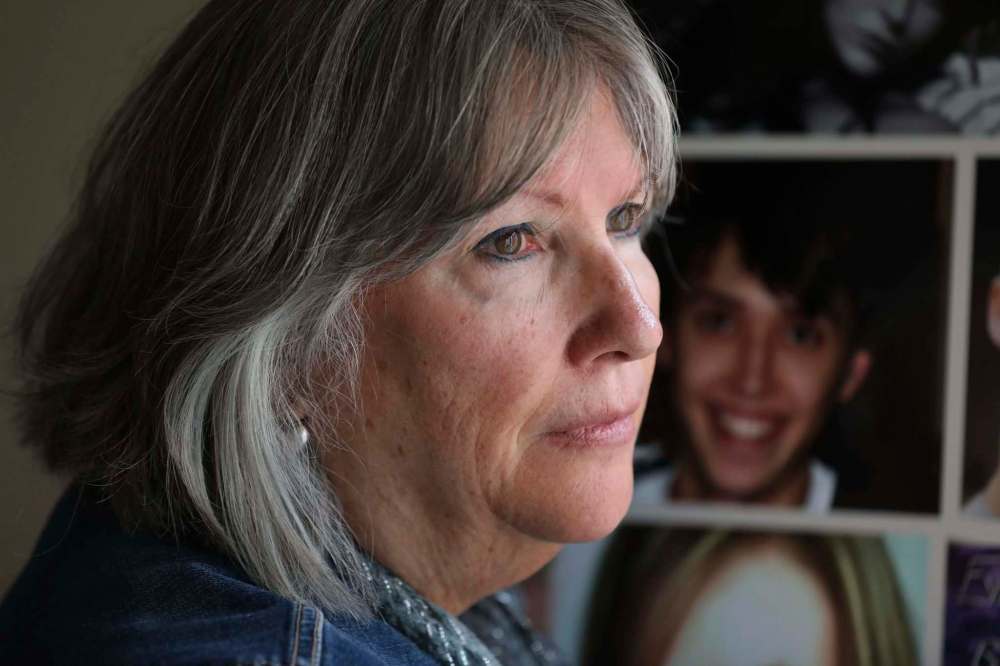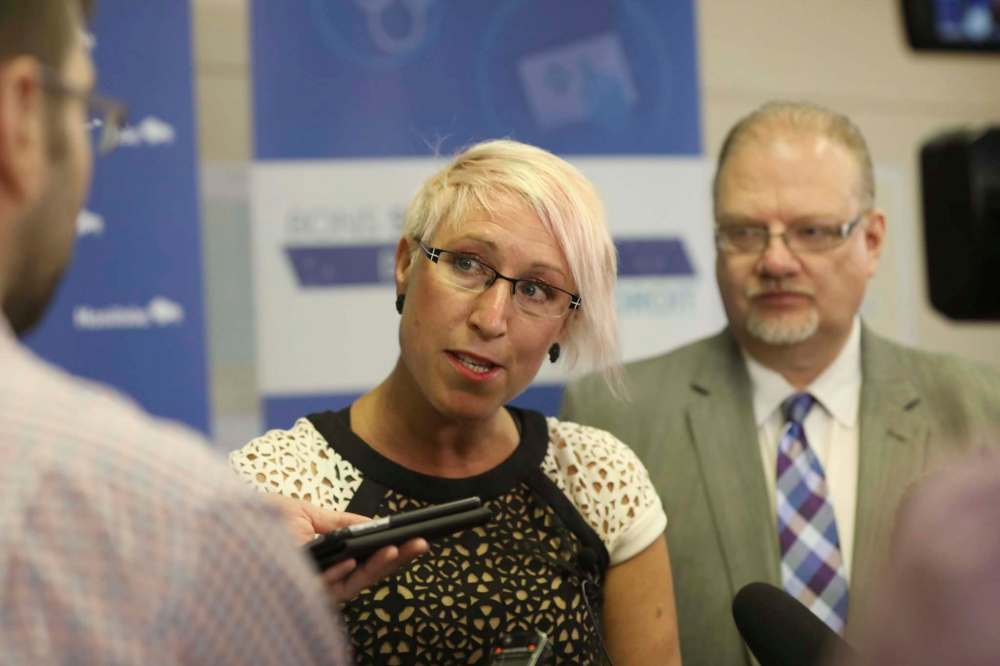Province to fund walk-in addictions clinics
Five rapid-access facilities will be modelled after Ontario program
Advertisement
Read this article for free:
or
Already have an account? Log in here »
To continue reading, please subscribe:
Monthly Digital Subscription
$0 for the first 4 weeks*
- Enjoy unlimited reading on winnipegfreepress.com
- Read the E-Edition, our digital replica newspaper
- Access News Break, our award-winning app
- Play interactive puzzles
*No charge for 4 weeks then price increases to the regular rate of $19.95 plus GST every four weeks. Offer available to new and qualified returning subscribers only. Cancel any time.
Monthly Digital Subscription
$4.99/week*
- Enjoy unlimited reading on winnipegfreepress.com
- Read the E-Edition, our digital replica newspaper
- Access News Break, our award-winning app
- Play interactive puzzles
*Billed as $19.95 plus GST every four weeks. Cancel any time.
To continue reading, please subscribe:
Add Free Press access to your Brandon Sun subscription for only an additional
$1 for the first 4 weeks*
*Your next subscription payment will increase by $1.00 and you will be charged $16.99 plus GST for four weeks. After four weeks, your payment will increase to $23.99 plus GST every four weeks.
Read unlimited articles for free today:
or
Already have an account? Log in here »
Hey there, time traveller!
This article was published 08/05/2018 (2794 days ago), so information in it may no longer be current.
In 2010, Christine Dobbs’s son, Adam Watson, wrote her a letter begging for help with his opioid addiction. In the six years that followed, Dobbs never could help him fight it.
There were emergency room visits that failed when Watson, suffering withdrawal symptoms, couldn’t handle the wait, so he’d leave to buy drugs. Watson lasted just three days in non-medical detox, his mother said, and without it he wasn’t accepted into any private treatment facilities.
Dobbs said she remembers thinking: there doesn’t seem to be an entry point to start figuring out what help might actually work.

On Feb. 6, 2016, Dobbs found Watson — a young electrician-in-training with a memorably bright smile — dead in the basement. He’d used fentanyl-laced cocaine and overdosed.
On Tuesday, Dobbs watched with optimism as Manitoba Health Minister Kelvin Goertzen announced funding for five Rapid Access to Addictions Medicine clinics (RAAM). This summer, RAAMs will open across the province: two in Winnipeg, one in Brandon, one in the Interlake area and one in northern Manitoba.
The clinics are modelled after existing facilities in Ontario, which seek to connect people struggling with addictions more quickly with the care best suited to them.
“There was nowhere to go,” Dobbs said. “So, this is a really good beginning.”
The Manitoba government’s plan to spend $1.2 million to get the clinics up and running is in keeping with the long-awaited Virgo report, Goertzen said.
The consultancy group was hired to develop a strategic plan for mental health and addictions. Goertzen said the report will be released to the public next week.
Access is key, the health minister said.
“The system in Manitoba is very much like a pinball machine,” Goertzen said. “People get into the addictions system and they bounce around from one part to the next. So, it’s difficult to get into the system and then, when you’re in the system, it’s difficult to navigate.”
While no specific clinic locations have been picked yet, Goertzen said the general geographic areas were selected based on need — and one RAAM will most likely be located at Health Sciences Centre in Winnipeg.
The goal is anyone struggling with any substance use disorders or addictions, whether it be opioids or alcohol, can walk in or be referred to the clinic for more immediate care. While that will benefit those in crisis, medical director of Addictions Foundation Manitoba, Dr. Ginette Poulin said, it will have the added benefit of helping reduce wait times.
Looking specifically at Ontario, Poulin said some ERs have seen a reduction of 60 per cent in addictions-related visits because people are able to go to the rapid-access clinics.
The Manitoba clinics will have a doctor, an addictions specialist, a nurse, a counsellor and, occasionally, an outreach worker, she said. They’ll be able to provide people with appropriate care while they await referral to specialists or other community treatments and supports.
“This is a model that not only helps improve access to treatment of all substances in a timely fashion, but also helps to appropriately assess, manage and support the individual,” Poulin said. “It best meets the individual where they’re at.”
Rapid-access clinic proponents in Ontario met Tuesday’s announcement with enthusiasm.
Kristin Kerr manages two such clinics in Guelph and Kitchener. The Kitchener location opened in March, while the Guelph clinic celebrates its first anniversary in June.
“Just getting access to this kind of support has really made positive shifts for people I see every week when I come to the clinic,” she said.
The two clinics in southern Ontario are open once a week and staffed by a doctor, an addictions counsellor and a peer support worker who has experienced addiction. The clinics are walk-ins, Kerr said, so people who feel motivated to make a change can immediately act on that feeling.
Above all, she said, it’s a stigma-free environment.

“Historically, addictions hasn’t been viewed as a health issue, it’s been viewed as bad choices and bad behaviour and something that people should be able to control,” Kerr said. “But really, addictions is a health issue that affects a broad spectrum of the population.”
That’s evident from the people who walk in the door, she said: they are old and young, of various genders and different races with different socioeconomic statuses and cultural backgrounds.
Dr. Hasan Sheikh, medical lead for the rapid-action addictions medicine clinic at the University Health Network (UHN) in Toronto, said it’s also noticeable how many experiences echo Dobbs and her son’s.
“A lot of patients say it’s the first time they’ve been able to access these services,” said Sheikh, an emergency physician who has helped lead the clinic since its opening in January. “We’re finding it’s a really good model to make sure we’re providing as low-barrier access to care as possible.”
While it’s too soon to offer up numbers, data or publish a report on the UHN experience, he said roughly 60 per cent of people who access the clinic come for alcohol reasons, some 30 per cent are there for help with opiates and 10 per cent or so come for help with crystal meth, cocaine or crack cocaine.
The clinic works, Sheikh said, because it’s sensitive to the realities of living with substance issues: the clinic is there to help right when the person is ready.
“The hallmark of the disease is the dysfunction that comes in someone’s life,” he said. “Asking someone to wait for a referral to come in three months down the road or attend an appointment at a specific time just doesn’t work for this population.”
Manitoba NDP health critic Andrew Swan said, the Ontario program “sounds positive,” but he’d like to see more action from the province. During the party’s health-listening tour, Swan said people spoke about the need for a “multi-pronged approach.”
“The best way to save money is to prevent people from getting addicted to drugs like methamphetamines in the first place,” he said.
“But when they do, we know there’s a need for long-term care facilities, and we know there’s a need to detox.”
Compassion will need to be at the forefront if the RAAM clinics are going to work in Manitoba, Dobbs said. “These young people that are on any kind of substance, they need to see that they’re not going to be shamed or guilted.”
It’s clear to Dobbs Manitoba’s health system was not prepared to deal with addictions. She’s keeping a close eye on what happens next, hoping the clinics will help people accept addictions is a health problem, not a criminal one.
“These are not bad people,” she said. “These are our children.”
jane.gerster@freepress.mb.ca

